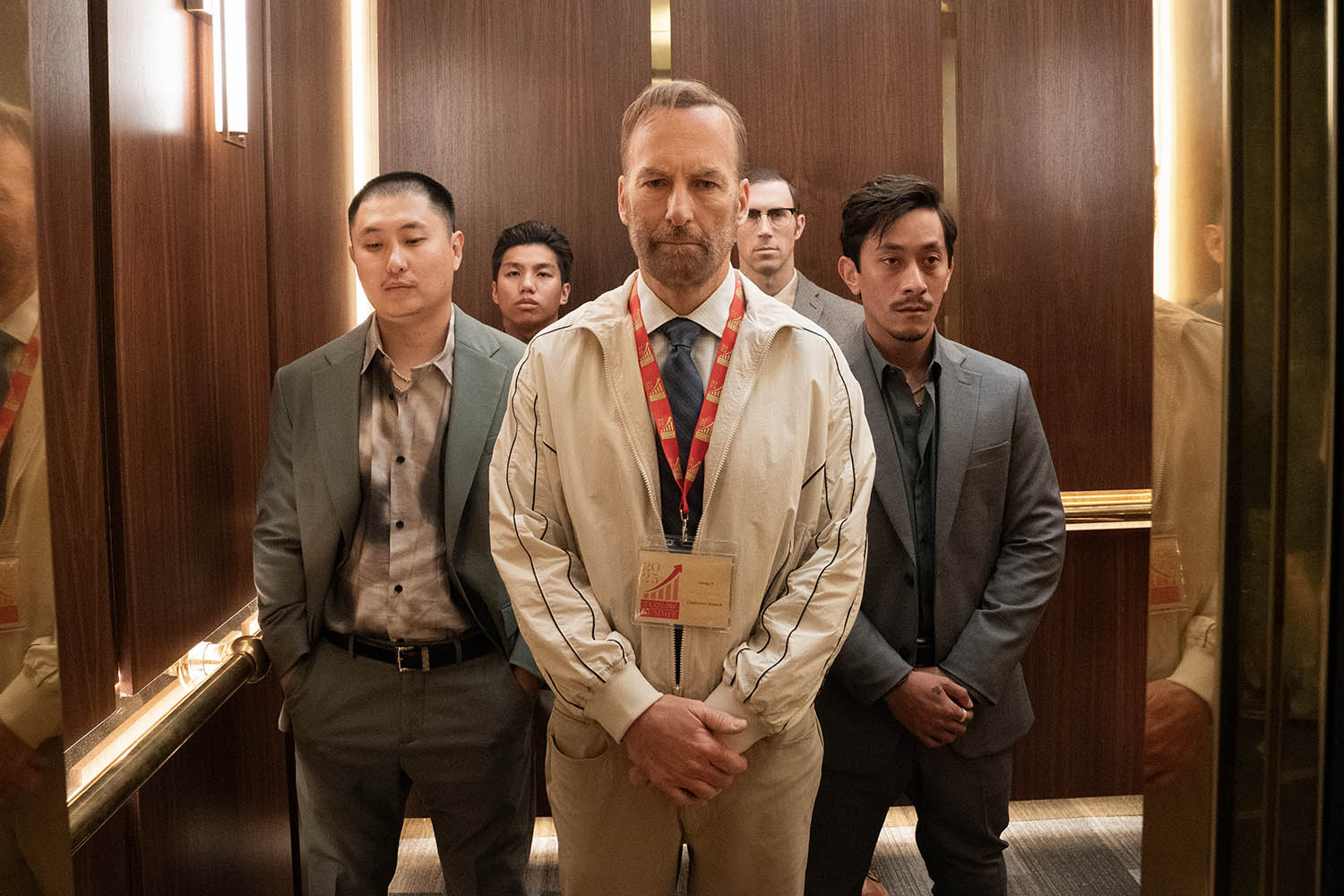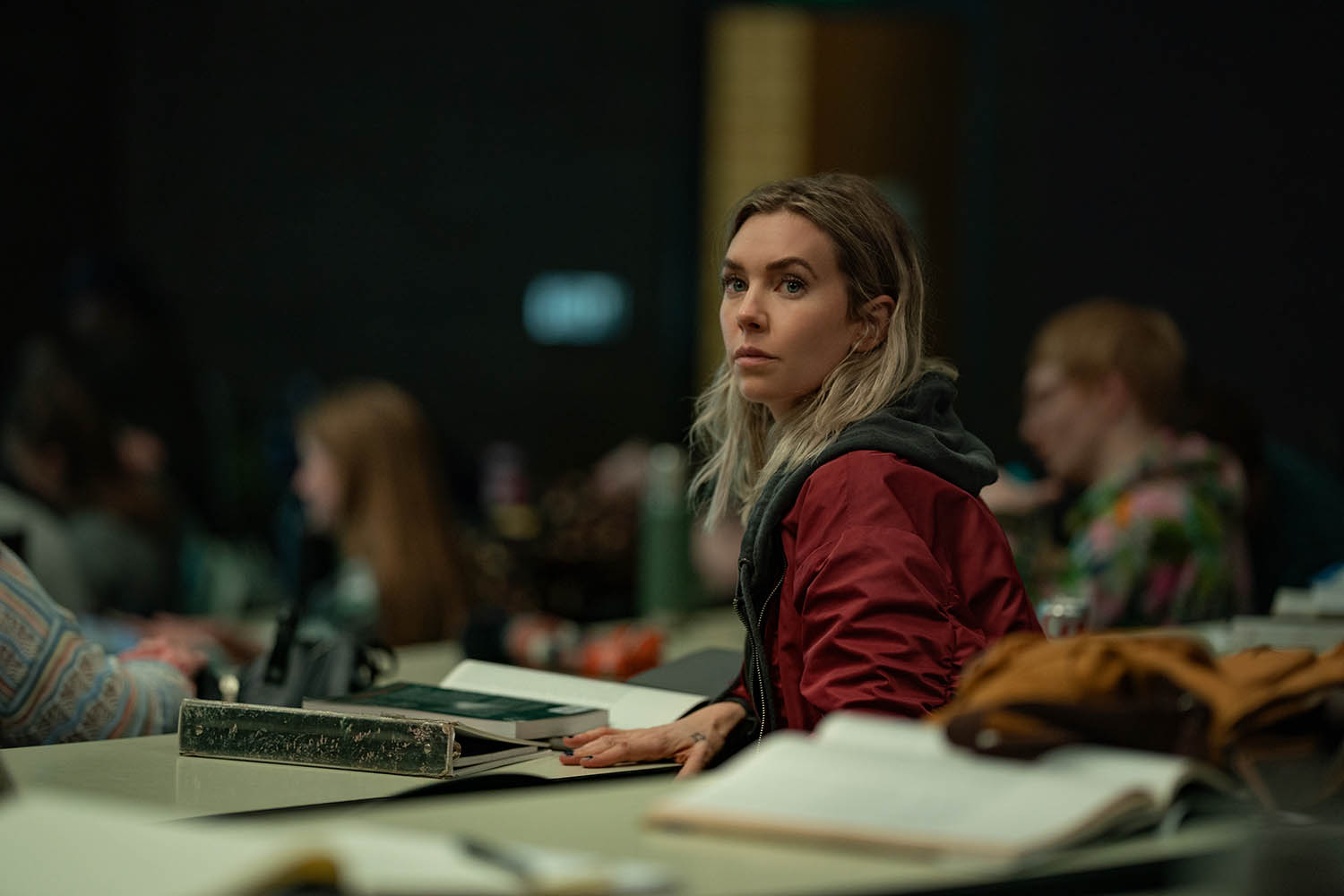Oslo Stories Trilogy: Love
(120 mins, 15) Directed by Dag Johan Haugerud; starring Andrea Bræin Hovig, Tayo Cittadella Jacobsen, Marte Engebrigtsen
This is the second release from Norwegian director Dag Johan Haugerud’s Oslo Stories Trilogy, which began in UK cinemas two weeks ago with the sublime Dreams. Love performs a similarly Rohmer-esque, deliciously light-footed dance around its titular subject.
Co-workers Marianne (Andrea Bræin Hovig), a straight-talking urologist who specialises in prostate cancer, and Tor (Tayo Cittadella Jacobsen), a compassionate male nurse, are both open to the idea of romance, but neither are interested in conventional relationship structures. Marianne allows herself to be set up on a blind date with a sweet, soft man on the rebound from his second marriage, but makes it bruisingly clear that another wedding is not on the cards; Tor – good-looking, gay and sunnily uninhibited – rides an Oslo ferry at night looking for fleeting, no-strings connections, whether sexual or conversational. One evening, Marianne and Tor meet by chance on the boat; Tor’s description of his hookups sparks Marianne’s interest. Could this approach to love work for her too? Or do double standards surrounding female sexuality fence her into more socially acceptable routes to romance?
Haugerud’s gift for creating fleshed-out, multidimensional characters is on show once again, as is his knack for getting under the skin of the city: if there’s love in this film, it’s as much for Oslo as it is for other people. In its unassuming manner, this is an example of quietly daring storytelling. That’s in part because it is full of dense dialogue and unabashed talkiness, but mainly due to the fact Haugerud has created a sexy film about the unsexiest of subjects: altruism, kindness and the act of doing good.
Nobody 2
(89 mins, 15) Directed by Timo Tjahjanto; starring Bob Odenkirk, Connie Nielsen, Christopher Lloyd
The face-mashing, teeth-shattering action picture Nobody was a breakout success in 2021, launching a new chapter in the career of Bob Odenkirk (Better Call Saul). He played Hutch Mansell, a meek suburban dad whose buried past as a hired killer re-emerges – and how! – after a botched robbery at his family home. The film, with its tongue firmly planted in its bruised and bloodied cheek, was a gloriously over-the-top onslaught of inventively grisly carnage.

Bob Odenkirk as Hutch Mansell in Nobody 2, directed by Timo Tjahjanto
This sequel reprises the family man-turned-badass formula but loses the deliriously enjoyable element of surprise and some of the slick efficiency of the mayhem.
What it gains is an eye-watering escalation in violence. And violence was not something the first film stinted on. There are moments so squirm-inducing you risk corkscrewing yourself clean out of the cinema seat, while others seem clumsily contrived: a samurai sword duel? In a down-at-heel amusement park? Martial arts maniac Timo Tjahjanto takes over directing duties from Ilya Naishuller, and while plot logic is perhaps not Tjahjanto’s forte, there’s no more kinetic a camera in the business. Expect to be tossed around like washing on a spin cycle.
Night Always Comes
(108 mins, 15) Directed by Benjamin Caron; starring Vanessa Kirby, Jennifer Jason Leigh, Zack Gottsagen
Adapted from Willy Vlautin’s gritty evisceration of the American dream, The Night Always Comes, Benjamin Caron’s follow-up to his slippery crime caper Sharper is a propulsive but uneven portrait of a woman on the edge. Lynette (Vanessa Kirby) is poised to buy the grim little house in a suburb of Portland, Oregon, that she rents with her mother (Jennifer Jason Leigh) and her brother Kenny (The Peanut Butter Falcon’s Zack Gottsagen), who has learning disabilities. It’s a matter of urgency: every time a radio is switched on, there’s a blunt news report about evictions and homelessness.

A ‘too glossy’ Vanessa Kirby in Night Always Comes
But then her mother blows her share of the deposit and Lynette embarks on an increasingly desperate overnight quest for the $25,000 she needs. Think the Dardenne brothers’ Two Days, One Night with a touch of Michael Morris’s To Leslie. Except unlike Marion Cotillard in the former and Andrea Riseborough in the latter, Kirby is a little too glossy and glowing of complexion to convince as a woman who works three jobs and gets most of her nutrition from bar snacks and bourbon.
Motherboard
(87 mins, 15) Directed by Victoria Mapplebeck; featuring Victoria Mapplebeck, Jim Mapplebeck
For film-maker Victoria Mapplebeck, the most effective way to make sense of life’s vicissitudes is to view them through a lens. This is true of the highs (the birth of her son Jim, the giddy moments of hilarity they share, the songs, the holidays) and the lows (the discovery that she was pregnant – and skint – at the age 38, by a man she had only met four times; the breast cancer diagnosis that shook the security of the family unit she had created as the sole parent of her then teenage son).
Part of what makes this intimate documentary about a mother and son, compiled from footage shot over nearly two decades, so affecting is Mapplebeck’s gift for seeing beauty in what she films – yes, even the biopsy of her cancer cells. A work of rare honesty and generosity.
Unmoored
(93 mins, 15) Directed by Caroline Ingvarsson; starring Mirja Turestedt, Anna Próchnia, Ia Langhammer
Swedish TV presenter Maria (Mirja Turestedt) has an enviable existence. A successful husband, a supportive marriage, a house that looks ripped from the pages of a Scandi design magazine. But beneath the veneer, her life is crumbling. Her husband is an overbearing bully who has recently been accused of rape; her career aspirations come a distant second to his.
Finally, Maria snaps, severing her ties to him in the most final way imaginable. It’s a satisfyingly devious study of the breakdown of a relationship, and of Maria herself, as she struggles with guilt and delusions of persecution. But this oppressive psychological thriller would be a great deal more rewarding if Maria – an apparently brilliant woman – wasn’t such a clueless and inept criminal.
Photographs by Universal Studios/Netflix
Newsletters
Choose the newsletters you want to receive
View more
For information about how The Observer protects your data, read our Privacy Policy

